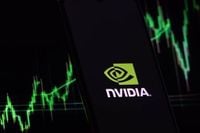The number of centi-billionaires has shrunk from 16 to 13 this year, according to the Bloomberg Billionaires Index, as aggressive U.S. tariff policies have heightened market volatility. The market downturn in the first three months of 2025, the worst since 2022, was fueled in part by investor jitters over U.S. President Donald Trump’s aggressive tariff policies, which have heightened volatility and weakened confidence.
Jensen Huang, once one of the biggest beneficiaries of the AI stock boom, has seen his fortune drop by $17.7 billion this year as Nvidia shares tumbled 18% since January. His net worth now stands at $96.7 billion, ranking him 16th on Bloomberg’s Billionaires list. Nvidia’s stock, which soared to record highs last year, has suffered as a result. Despite the setback, Huang remains significantly wealthier than he was two years ago when his net worth stood at roughly $25 billion, though he is still well below his $130 billion peak from last November.
Michael Dell has also taken a substantial hit, losing $24 billion in the first quarter of 2025. His fortune now hovers just below $100 billion, at $99.6 billion, placing him 14th on the list of billionaires. Spanish billionaire Amancio Ortega, founder of Inditex, the parent company of Zara, has also been knocked out of the $100 billion club. His net worth dropped by $2.2 billion to $99.1 billion after Inditex shares declined about 7% this year. Weaker consumer demand and unfavorable currency conditions have weighed on the company’s valuation.
Other high-profile billionaires have also taken heavy losses. Tesla’s Elon Musk remains the world’s richest person but has lost $110 billion this year, bringing his net worth to $323 billion. Oracle’s Larry Ellison and Amazon’s Jeff Bezos have also suffered steep declines, with their fortunes falling by $28.1 billion and $25.4 billion, respectively. However, not all the ultra-rich have seen their wealth shrink. Warren Buffett and Bill Gates have bucked the trend, with Buffett’s net worth climbing by $24.5 billion to $167 billion, thanks to a rally in Berkshire Hathaway stock. Gates, largely due to his $78 billion in cash holdings, has added $2.9 billion this year, pushing his fortune to $162 billion.
Nvidia (NVDA) stock price has been sliding since the start of the year. In March, it dropped 13%, and there has been a 28% decline since a 52-week high set in early January. This downturn has had a remarkable effect on the forecast Nvidia price-to-earnings (P/E) ratio, which has fallen as low as 25. Earnings growth forecasts could drop it even further by 2028, as low as 17. That’s the kind of valuation that wouldn’t be out of place on the FTSE 100, raising questions about whether the market has got the price badly wrong, or analysts are seriously out with their forecasts.
US export rules already prevent Nvidia from exporting its new generations of processor chips to China, where a lot of the world’s artificial intelligence (AI) development is shifting. The older H20 chips are currently the big seller in that market. However, Chinese regulators have issued energy-efficiency rules for the kinds of chips used in data centers, which could impact H20 chip sales. Investors are worrying that today’s massive AI spend might be overheated and unsustainable. The big movers in the business are in a bind. If AI progresses as fast as the hype suggests, they surely can’t afford to miss out. But if the headlong rush should slow, everyone would be in the same boat.
Despite the challenges, analysts still seem confident in Nvidia’s future. The great majority are urging investors to buy, with an average price target of $171. That’s a 55% premium on the price at the time of writing and would set a new all-time high for the stock. Nvidia’s shares are trading near a year-to-date low, yet some investors remain optimistic for a sustained rebound in the coming months, perhaps even a revisit to all-time highs if tariff fears dissipate and macro data improves.
Nvidia controls an estimated 80% of the AI accelerator market through its H100/H200 GPUs and CUDA software ecosystem. Its data center revenue has surged from $4.3 billion in Q1 2023 to over $35.6 billion in Q4 2024. The AI chip market is projected to reach $400 billion by 2030, and Nvidia is well-positioned to capture growth from this market, provided it can maintain its market dominance.
However, concerns remain regarding Nvidia’s ability to hold onto its massive margins as competitors catch up. The company has been able to defend its hold on the market so far, achieving industry-leading gross margins at 73% in Q4 FY2025. But the question looms: how long can this last?
Looking ahead, estimates for Nvidia’s stock price in 2030 vary widely. In the bull case, analysts predict a price of $491 per share, assuming that AI growth continues and Nvidia retains its market share. The base case suggests a price of $362, while the bear case assumes that the AI narrative would fail, leading to a price of just $38. This disparity highlights the uncertain future of Nvidia and the AI market as a whole.
George Seay, founder and chairman of Annandale Capital, has expressed caution regarding Nvidia’s valuation. He noted that the company’s value has increased tenfold over about 2.5 years, indicating a rapid rise that may not be sustainable. He believes that if Nvidia's margins compress due to increased competition, the stock is not as cheap as some might think.
As the market continues to react to economic uncertainties and the evolving landscape of AI technology, Nvidia finds itself at a crossroads. Investors are left to ponder the future of this tech giant and whether it can navigate the challenges ahead while maintaining its position as a leader in the AI chip market.







